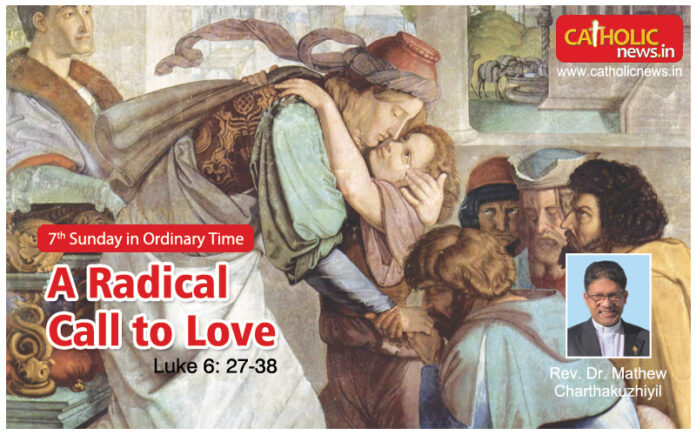
The Gospel of Luke presents us with one of the most profound and challenging teachings of Jesus: “Love your enemies, do good to those who hate you” (Lk. 6:27). These words are not merely an idealistic aspiration but a radical call to imitate the boundless love of God. Jesus invites us to break the cycle of hatred and violence through the transformative power of love and mercy. In a world filled with division and injustice, the only path to healing is through compassion. Such love is not passive; it demands strength, courage, and a faith deeply rooted in the knowledge of God’s love for us. When we are convinced of this love, we become instruments of transformation in the world.
A story illustrates this truth beautifully. In a small village, two brothers, Elias and Samuel, inherited their father’s land. Elias, driven by greed, took the fertile portion for himself, leaving Samuel with the barren hillside. Though hurt, Samuel chose not to retaliate. Instead, he tilled the rocky soil with perseverance and prayer. Over the years, his land flourished, producing abundant fruit, while Elias’s fields, though initially fertile, suffered from neglect and selfishness. When a fierce storm destroyed Elias’s crops, leaving him in despair, Samuel faced a choice: to turn away or to respond with love. He embraced his brother, shared his harvest, and invited him to rebuild together. Overwhelmed by this unexpected mercy, Elias wept and asked, “How can you forgive me after all I’ve done?” Samuel replied, “Because love is stronger than hatred, and forgiveness is the seed of peace.”
Jesus does not merely ask us to avoid revenge; he commands us to love even those who wrong us. This command transcends human instinct and enters the realm of divine grace. Human love is often conditional and transactional, but divine love is freely given, expecting nothing in return. Jesus urges us to “be merciful, just as your Father is merciful” (Lk. 6:36). Mercy is the bridge between humanity and divinity, and when we love our enemies, we reflect the very heart of God. Forgiveness is not a sign of weakness but of great strength; it disrupts the cycle of hatred and opens the door to healing and reconciliation. When we choose forgiveness, we become agents of God’s work in the world. Jesus promises that when we give freely, “a good measure, packed together, shaken down, and overflowing, will be poured into your lap” (Lk. 6:38). This promise extends beyond material blessings; it is a spiritual truth. The more we love, the more we receive the grace to love even more.
How can we respond to this radical call to love in our daily lives? First, we must bring our wounds before God in prayer, asking for the grace to see others through His eyes—not as adversaries, but as His beloved children. Second, we must seek opportunities to show kindness, especially to those who do not seem to deserve it. A simple word of encouragement, an act of reconciliation, or a gesture of generosity can reflect God’s boundless love. In the Lord’s Prayer, we pray, “Forgive us our trespasses, as we forgive those who trespass against us.” Forgiveness is not an option for the Christian; it is a necessity. When we love our enemies, we surrender our desire for vengeance and trust in God’s justice. Let us commit ourselves to being witnesses of Christ’s love in a world so often darkened by hatred and division. Let our words and actions proclaim the beauty of divine love, which seeks to redeem rather than condemn, to restore rather than destroy. May we, like Jesus, choose love over hatred, forgiveness over bitterness, and mercy over judgment, trusting that God’s love has the power to transform even the hardest of hearts.
Rev. Dr. Mathew Charthakuzhiyil



